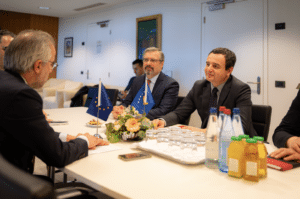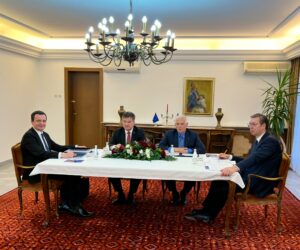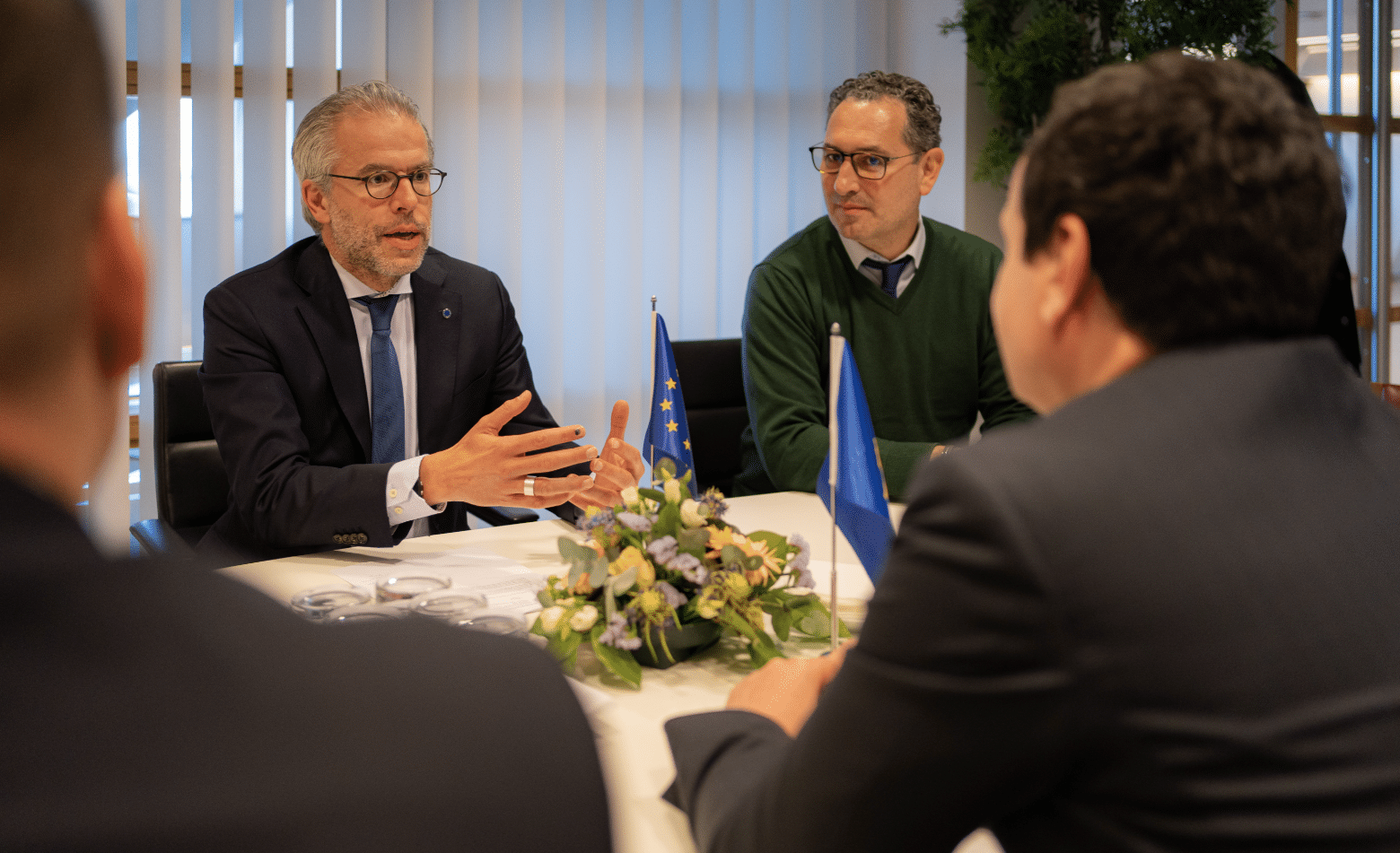Brussels – One small step for the European Union, one giant leap for Kosovo. Even if the conditions for getting there have been on the table for years, embarrassing the EU institutions, Kosovo visa liberalization will become soon reality thanks to the green light of the European Parliament. Following the vote in the plenary session, also the citizens of the last remaining European country – except for Russia and Belarus – will be able to access to the EU and the Schengen area only with their passports. “This is the opening of a new chapter in our relationship”, the rapporteur for the European Parliament, Thijs Reuten (S&D), confirmed in an interview with Eunews.
In a few months, the same rules will be applied to all Western Balkan countries – Albania, Bosnia and Herzegovina, Kosovo, Montenegro, North Macedonia and Serbia – in order to have access to the area where internal borders are abolished: no need to apply for a visa for short-stays (90 days in any 180-day period). What is almost taken for granted by EU citizens will become a reality for Kosovar citizens as well, coming closer to the awareness of being part of “the same continent, the same family, the same heritage, the same history”, the Dutch MEP hopes.
Why is the adoption of Kosovo visa liberalization so meaningful?
“The final adoption of Kosovo visa liberalization by the plenary session of the European Parliament means that we have completed the legislative process and we can hold the signing ceremony tomorrow, April 19. It goes without saying that it has been long overdue, because Kosovo has been fulfilling the criteria for many years. It is an historic breakthrough, considering that Kosovar citizens who do not have access to either an Albanian or Serbian passport are not able to travel easily in the rest of Europe. And it also has a symbolic value. To me, this is the start of a new era, because finally Kosovo will join all the other visa-free countries”.
When will it go into effect?
“At the latest on 1st January 2024, there will be visa-free travel for Kosovar citizens. I would have wanted an earlier date, but this is linked to the Etias [European Travel Information and Authorisation System, ndr] entry into force, that has been postponed too many times. It was supposed to be already active, according to the original plan. If a miracle happens and the system will be running before, theoretically, Kosovo visa liberalization could start earlier. But let’s focus on 1st January 2024″.

What will it change then for Kosovar citizens?
“That they can decide to travel freely to the European Union. They still have to show their passport, when they enter the EU or the Schengen area, like many other people from all over the world. However, they will no longer have to think to get a visa. Every time you have to pass through this process, you feel like doing an exam, although you are sure that you fulfill all the conditions. Us, the EU citizens, are used to travel easily wherever with our national passport, we need to get a visa for a very few countries. But for Kosovar citizens it was not like that”.
Why did it take us so long?
“I think it took us so long because of political reasons in the Council. Some governments used this last pending European file in the series of visa liberalization in internal political debates. This is not good, because there are always elections coming up somewhere or political reasons to postpone a decision. It is very simple: if we set rules and conditions – and a country meets all of them – we have to deliver. Unfortunately, the European Union has a tradition not always to deliver even when conditions are fulfilled. This is something that undermines the trust in the process, like in the case of Kosovo visa liberalization”.
Albanian prime minister, Edi Rama, said that Kosovar citizens were more connected to Europe when they were part of Yugoslavia…
“Kosovo was left behind for so long, it was the last European country without visa liberalization. Even Bosnia and Herzegovina and Montenegro got it a long time ago. Kosovar citizens were left aside, resulting in the situation that they were feeling less free or less included, compared to the times when they were part of former Yugoslavia. The more you think about it, the more ridiculous the situation gets. In any case, Kosovo kept faith in the process, and now everything is behind us”.
How was the attitude of the political groups in the European Parliament?
“In the European Parliament, there has never been an issue, and we have always been the co-legislator pushing for the visa liberalization. When Kosovo fulfilled all the conditions more than four years ago, based on the European Commission’s report, we pushed to go ahead with a large majority. In the Council, when the Czech presidency saw a window of opportunity last year, we could finally strike a deal thanks to all EU governments, because moving Kosovo from one list to the other was not a very complicated issue in technical terms“.
However, five EU Member States still do not recognize Kosovo as an independent State.
“Spain, Greece, Cyprus, Romania and Slovakia have had different paths in their position of non-recognition of Kosovo, but I hope that all of them will be engaged in this debate. I am really counting on them to assess the situation: it does not have to happen next week or next month, but there is a need for some kind of change. I think it would be quite illogical, if these five countries will not show at least their willingness to move in the direction of recognizing Kosovo. In particular considering the direction the EU is taking on the normalization agreement, that we want to be binding and implemented”.
 You are referring to the agreements between Kosovo and Serbia reached between February and March.
You are referring to the agreements between Kosovo and Serbia reached between February and March.
“Yes, I see a situation moving towards recognition. Because the agreement includes the recognition of travel documents and symbols of Kosovo, the non-objection by Serbia to membership of Prishtina in international organizations, and also not encouraging others to block. I am confident there will be some good news in the next months, thanks to this agreement: an implementation committee will be set up, there are very important talks ongoing, for example the one on the missing persons. In small steps, we are moving”.
There has been a big discussion about the fact that the agreement has not been signed. At the same time, the EU is using the financial leverage as a tool of persuasion for the implementation.
“If this agreement will not be implemented, there will have to be severe consequences. We must be strict and step up our game. Because now we have a binding agreement, I think that the HRVP Josep Borrell did a great job. There is no discussion on the signing, the attention in Serbia and Kosovo has to be only on the implementation, because we will put what has been agreed into the framework of the respective EU accession processes of Kosovo and Serbia”.
Does it have particular implications for Serbia?
“Both countries must implement the agreement as fast as possible, of course. However, we saw Kosovo negotiating in a tough manner, but in good faith, while on the other side the Serbian President [Aleksandar Vučić, ndr] wants to create a sort of insecurity in and around the process. Moreover, we have a Hungarian commissioner [for Neighborhood and Enlargement, Olivér Várhelyi, ndr] who is not serving the interests of the European Union, that is to bring all the candidate countries closer to the European Union, on equal footing and measured against the same high standards. Just a couple of weeks ago, the day after Vučić returned to Belgrade saying he would not sign the agreement, he got 600 million euros from the EU, the biggest grant ever given to Serbia. For this wrong signal, I asked a written question to the European Commission about it”.
What should the EU ask Serbia?
“I am a friend of Serbia too, I want this country to join the EU as well, but we need to be clear about the conditions: democracy, impartial political structures, Rule of Law. And the EU membership cannot be achieved, if Serbia is involved in all kinds of destabilizing actions from Montenegro to Bosnia and Herzegovina and faces democratic backsliding. If we can find the road to make its accession a success, as the biggest country and economy Serbia could lead the entire region in joining the EU family“.







![Una donna controlla le informazioni sul cibo specificate sulla confezione [foto: archivio]](https://www.eunews.it/wp-content/uploads/2014/12/Etichette-alimentari.jpg)
